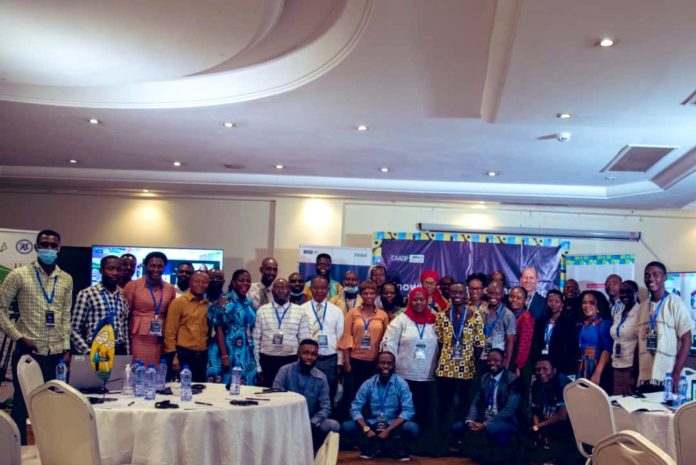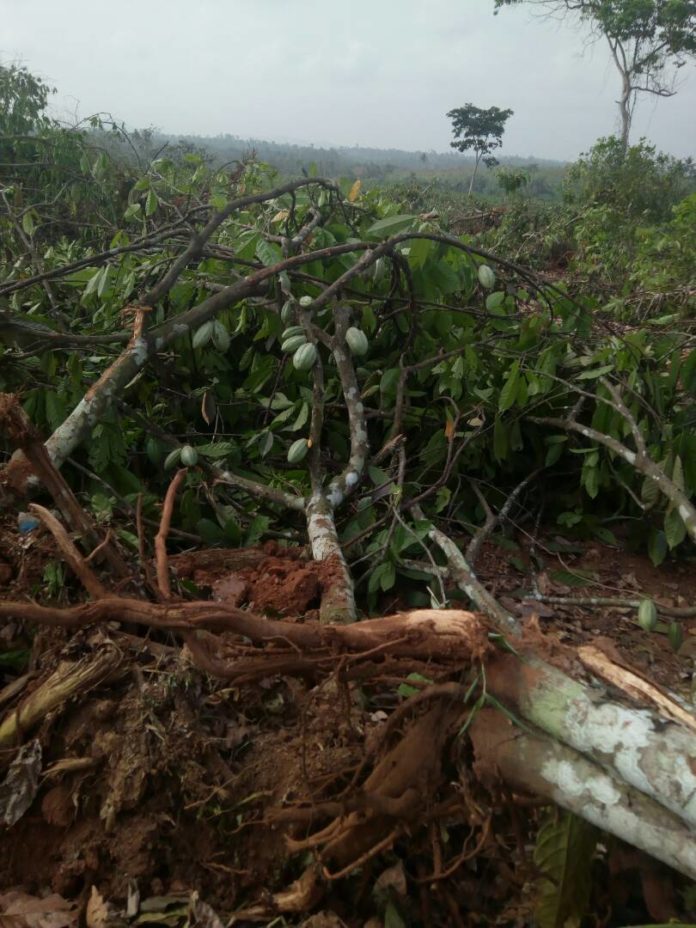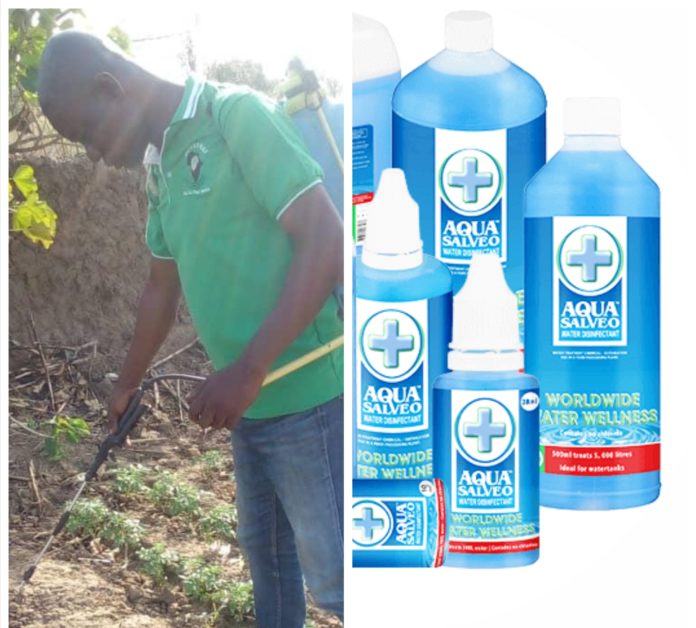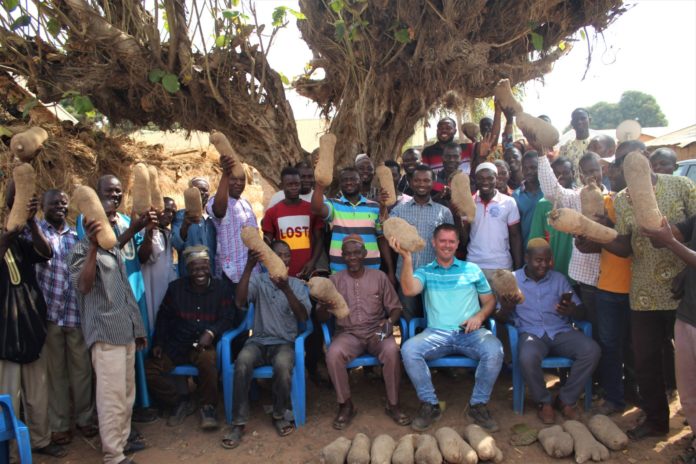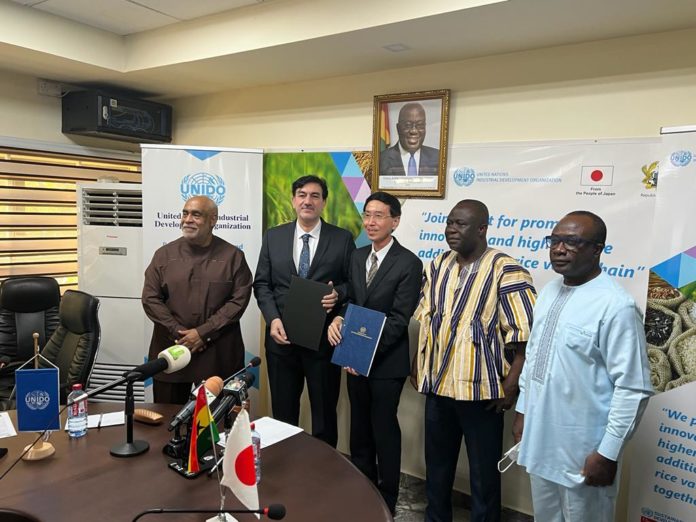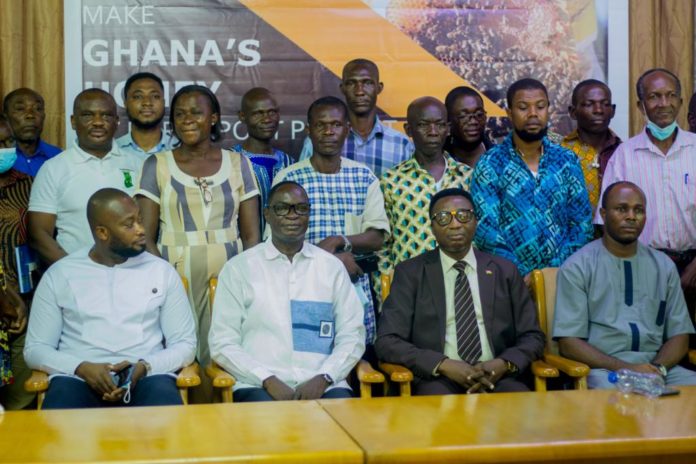Despite the gains made towards achieving Agricultural Transformational Development in Ghana, significant challenges remain in ensuring that the newly promoted Akosombo Integration Agenda to deliver sustainable services continues well into the future.
Dikoto Chief to cut down over 250,000 acres of Cocoa Farms if authorities do not intervene immediately.
Ghana’s cocoa is one of the best in the world. It is cultivated in six regions in Ghana: Western, Central, Brong Ahafo, Eastern, Ashanti, and the Volta regions. At its peak, it accounts for about 66% of the country’s foreign exchange.
Aqua Salveo, an organic product to resolve the use of harmful chemical fertilizer menace.
Ghana’s agriculture sector is hit with price hikes of Agro-inputs skyrocketing prices of food commodities in the country. This menace is greatly affecting the farmers in production evicting some from the sector.
To curtail this challenge, Aqua Salveo, an organic product in a liquid form that possesses active ingredients of minute’s traces of micronutrients, enhances the growth of plants and livestock.
In plants, Aqua Salveo works as a micronutrient fertiliser. Agriculture is one of the largest sectors of economies that sustain the livelihood of numerous communities around the world.
Agriculture heavily depends on soil resources. These resources are currently being threatened by climate change and the exponential growth of the human population coupled with indiscriminate human activities on the planet earth.
Aqua Salveo is an organic fertiliser product that could be applied to all kinds of crops ranging from vegetables, Fruit, Pasture, Orchard, forestry, seedlings, ornamental, and many more.
Testing and justified by farmer Matthew Abdulai, interestingly, the application of Aqua Salveo micronutrient has no side effect on the plant and the soil due to its organic nature. Many countries across the globe are encouraging their farmers to produce organic food. The practice of using chemical fertilisers is being discouraged due to the long-term negative side effect on human health and the soil.
Apart from being a fertiliser, the product also works as a fungicide and an insecticide. Insects and fungi have been a serious threat in the agric space and are still a threat. With this product farmers in Ghana and across the world are sure of their maximum yield per hectare or acre depending on the type of crop in question.
Agriculture stands on two main legs. Plants and animals. Aqua Salveo is a good product for animals as well. The product fights all kinds of diseases in cattle, poultry, sheep, goats, pig, pets, and all kinds of livestock.
The measurement of Usage.
Three drops of the liquid are dropped in one liter of water. It is then left to stay for an hour, after which it can be used as a drink for humans and livestock.
For plants, you pour it in any spraying machine and used it to spray the crop.
Yam farmers welcome the introduction of technology to produce disease and virus free yam seeds to promote food security in Ghana.
Ghana is likely to be hit by hunger strikes due to the high cost of agro-inputs, climate change, and improper patronage of improved seeds by the farmers. These factors have increased costs of food production leading to price hikes of food commodities in Ghana.
UNIDO, Ghana, and Japan launch a project to boost rice production.
As a joint effort of the government of Ghana, Japan, and the United Nations Industrial Development Organization (UNIDO), a new project to strengthen the competencies of the Rice value chain in order to catalyze the use of modern technologies, realize higher value creation, and comply with market requirements was launched.
Nigerian businessman capitalises on opportunities in the cocoa industry.
In December 2021, Johnvents Industries, an agribusiness company in Nigeria, commissioned a cocoa factory in Ondo State. Jeanette Clark spoke to group managing director and founder, John A. Alamu, about his journey in the cocoa industry.
It started with microfinance.
Alamu’s first entrepreneurial venture was to provide 10 farmers with microloans. He was still working for a non-profit – the International Institute of Tropical Agriculture (IITA) – as a monitoring and evaluation specialist at the time. Those 10 clients eventually grew to a thousand.
Alamu then identified a gap in the market to buy the food crop harvests (maize, soya bean, and sorghum) from the farmers – his loan clients – and sell on to the larger buying agents in the region. However, the margins from these trades were limited and he researched opportunities in cash crops (a crop produced for its commercial value rather than for use by the grower). Selling these crops internationally would generate forex, which was an appealing prospect in a country that, in 2016, was struggling with a serious shortage of foreign currency.
Cocoa looked like the answer and after trading the crop for a while, Johnvents seized the moment to expand into processing when he found a local cocoa factory. The previous tenant of the facility (the building with some old equipment belongs to the regional cocoa farming cooperative) was Olam, a Singapore-based agribusiness multinational.
“The acquisition of the processing equipment in the factory was 100% internally funded,” he says. A total of 3 billion naira (US$7.2 million) was reportedly invested in the refurbishment of the factory, which is up and running and preparing for its first exports to a client in Spain.
Unique opportunity for each product
The factory currently processes the raw cocoa into cocoa butter, cocoa cake (a by-product after the butter has been extracted), and cocoa powder.
The butter is used in the manufacturing of chocolate and, for now, is earmarked only for the export market. While there is domestic demand for the butter from local soap manufacturers, it is still quite small. The cocoa cake is pulverised into cocoa powder mixes and can be sold in both the domestic and export markets. “At the moment, the price for cake is very favourable,” adds Alamu.
Johnvents sells its cocoa powder only in Nigeria. The company found it could obtain better margins if it packed the product in smaller sachets for retail sale and invested in a facility for this purpose.
Sourcing raw materials.
Before the factory was commissioned, the company was already trading cocoa and had links with farmers from whom it could secure supply, as well as the local buying agents who could provide the factory with aggregated cocoa. The company buys from these channels, paying a premium to make sure it gets the best quality.
To tap into the rising trend of traceability (the ability for an end-consumer to trace and know where a product has come from), Johnvents wants to re-establish a more direct supply relationship with the original 24 cocoa unions in the region that originally founded the factory. Once this is established, the company would be able to have some control over the farming practices of the cocoa.
“Over the medium term, we have contracted a consultant who will be working with these farmers. We will also provide the co-operatives with improved cocoa tree varieties and access to finance to improve their farming practices,” says Alamu. The company is simultaneously working on getting the required certifications to comply with European standards. Once in place, it would be able to cut out the middlemen it is currently selling the butter to. “Ultimately, this will make business more sustainable for us.”
Future acquisitions – chocolate on the horizon.
Johnvents is already in talks with local chocolate production companies, hoping to one day make its own chocolate. “There is one factory that is doing well, and we are exploring an acquisition or a joint venture.”
For Alamu, it is important that Nigeria reclaims its place as one of the top three cocoa production nations. “We used to be in the top three but today we are struggling at number four. Indonesia, which is number three behind Côte d’Ivoire and Ghana, produces over 700,000 metric tonnes of cocoa annually, while Nigeria can manage only about 360,000 metric tonnes. Private sector engagements in value addition will support local production and get the youths interested in farming cocoa again when they see a competitive market for their crop.”
The human rights court hears Ghana’s first GMO case yesterday.
Ghana’s first trial on the introduction of genetically modified foods into our agriculture was heard yesterday in Accra.
Make Ghana’s honey fit for local and export project launched.
It is undeniable fact that honey is one of the demanded commodities on the local and international market which has huge economic benefits. But the question is do beekeepers and honey value chain actors are aware of its health and economic benefits?
Cocoa Week celebration: Annul the idea that Chocolate is a luxury product – Cocoa Value Chain Analyst
Ghana is the second world’s largest producer of Cocoa and according to the Ghana Cocoa Board, Ghana produced about 1 million tons of cocoa during the 2020/2021 crop season. Despite the relative improvement in Ghana’s quest to become a cocoa consumption nation, its current per capita cocoa consumption, which hovers around 0.55 kilogram, is still nowhere near what exists in Europe and America, the main consumers of Ghana’s cocoa beans.
To increase the consumption level of locally made chocolate and other cocoa products, as it highlights the nutritional and health benefits of consuming cocoa products and the economic and wealth creation potential of the cocoa value chain, the Ghana Cocoa Board (COCOBOD), in collaboration with the Ghana Tourism Authority (GTA) and the Cocoa Processing Company (CPC) have launched the 2022 National Cocoa Week celebration at Mampong in the Eastern Region of Ghana.
African Agricultural Technology Foundation to host 19th International Triennial Symposium for Tropical Root Crops.
African Agricultural Technology Foundation (AATF) in collaboration with the International Society for Tropical Root Crops (ISTRC) and the Government of Kenya will host the 19th edition of the International Triennial Symposium of the International Society for Tropical Root Crops in Nairobi, Kenya, from 21st to 25th November 2022.

